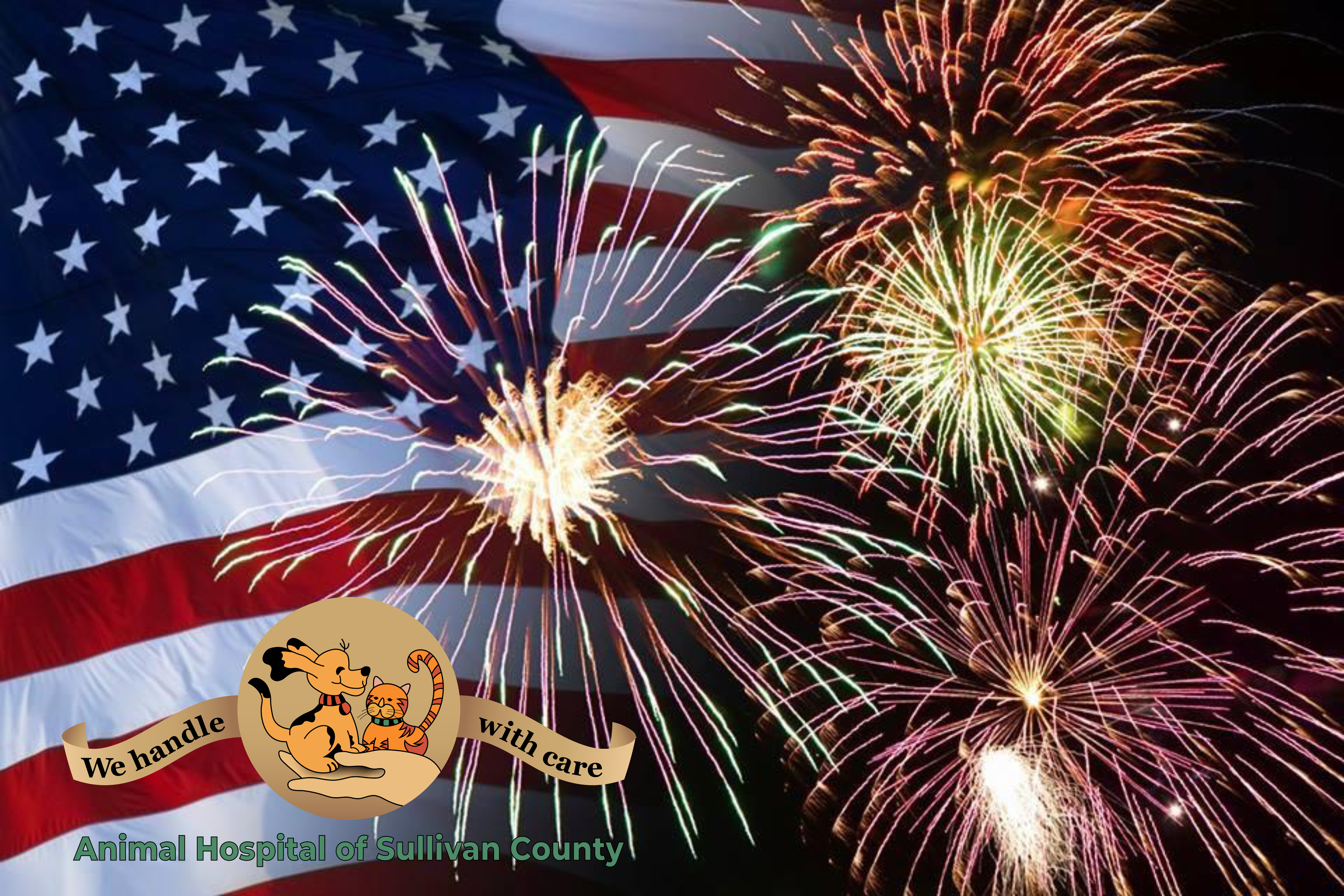
Fireworks, Pets & Vets
Fireworks, Pets, and Vets On July 4th, millions of excited folks will be setting off fireworks to help celebrate the two-hundred-and-forty-seventh birthday of the United States of America. It’s a tradition that’s almost as old as the U.S. itself. According the History Channel, it all started on July 4, 1777 in Philadelphia when ship’s cannon “fired a 13-gun salute in honor of the 13 colonies.” “At night there was a grand exhibition of fireworks,” the Pennsylvania Evening Post noted, “…and the city was beautifully illuminated.” The tradition took root. So much so, that Independence Day celebrations today—including parades, picnics, and even the grand ol’ backyard barbeque—don’t seem complete without some percussive noises and fiery bright lights. But while we the people undeniably enjoy these colorfully explosive displays, it’s always good to stop and consider the needs of two groups before lighting up bottle rockets randomly in the middle of the night: Our pets and vets. Let’s look at the first group. It’s probably no surprise to you that most of our animal companions don’t like the sounds that fireworks make when they go off. Because their hearing is so sensitive, the various booms, hisses, and rat-a-tat-tats associated with fireworks can cause our pets heightened anxiety, which can result in behaviors that are harmful. So, if you know fireworks are part of the plan nearby to your furry or feathered friends, it’s best to take action before they’re frozen in fear…or dashing toward the highway. Dogs, for example, will benefit from being put in a safe, quiet space that’s already familiar to them. It’s best to close windows and draw the curtains. Playing some music—or the TV—in the space can help reduce the impact of the bombs bursting in air outside. In some instances, medication can be used to calm your dogs down—just make sure to consult your doctor of veterinary medicine before doing that. In extreme cases, it might be best to arrange boarding for your pet away from ground zero. Cats who are afraid of fireworks will generally find a spot to hide in. Let them. There’s no sense in trying to get them to come out until they feel like everything is safe. For caged pets, it’s best to partially cover their dwelling…but take care to leave a spot so they can peer out. This way, the sound of the fireworks will be reduced, and your animal friend won’t feel isolated. It might also be a good idea to let them have some bedding they can burrow into. Also, we should all remember that—for our pets—danger from fireworks isn’t over once a cease-fire has been declared. For example, sparklers that haven’t quite cooled off can burn the pads on their feet. A pet eating firework residue risks choking. And even if your pet wolfs the residue down without a problem, it could be toxic for them. Exercise caution when letting them out the next day. Now…what about fireworks and our vets? And by vets, I mean our military veterans…particularly those who served in combat. My husband and I are both veterans, and we can tell you that most of the veterans we know just don’t like fireworks. Certainly, we’re very proud of our country and are respectful when attending formal ceremonies…ceremonies where we know fireworks are being featured, so we can prepare for that. But those random fireworks without warning that seem to occur in the middle of the night—without warning—days before and after July 4? No, we’re not really good with that. But why? The U.S. Department of Veterans Affairs explains it best. From their website: “‘As beautiful as they are, the sounds, smells and shockwaves of fireworks can be triggering for Veterans with Post-Traumatic Stress Disorder or PTSD,” said Annie Tang, staff psychologist at Edward Hines, Jr. VA Hospital. “These can bring up emotional and physiological reactions, and bring up trauma memories from the past, which can bring up intense anxiety and fear.’” “Tang explained that the brain is very good at pairing things, especially threat. Combat Veterans and those who worked in combat zones can pair threat with whatever was in that environment, including things they saw, heard or smelled. “These pairings can continue after returning to civilian life. So, when fireworks or other loud noises occur, a Veteran’s brain can feel in danger” (Moeller, Matthew. “How Your Fireworks May Affect America’s Veterans.” June 22, 2022. www.va.gov). There are certain things that author Matthew Moeller recommends to veterans to help them cope. These include:
1. Gradually confront your fears.
2. Remind yourself where you are and what’s around you.
3. Lower your body temperature with a shower or an ice pack.
4. Boost your mood by doing things you enjoy.
5. Get counseling if needs be. These ideas make a great deal of sense and can certainly be of benefit. But it isn’t all up to our veterans. As a society, we can show our appreciation for both our pets and vets by keeping our use of fireworks, well, predictable…scheduled, controlled, supervised, and set off only by people who really know how to use them. In this way, everyone concerned can celebrate Independence Day safely and joyously. Happy birthday, America! Dr Barbara J Bodolosky DVM Animal Hospital of Sullivan County 667 Harris Rd Ferndale NY 12734 845-292-6711 www.ahofsc.com


